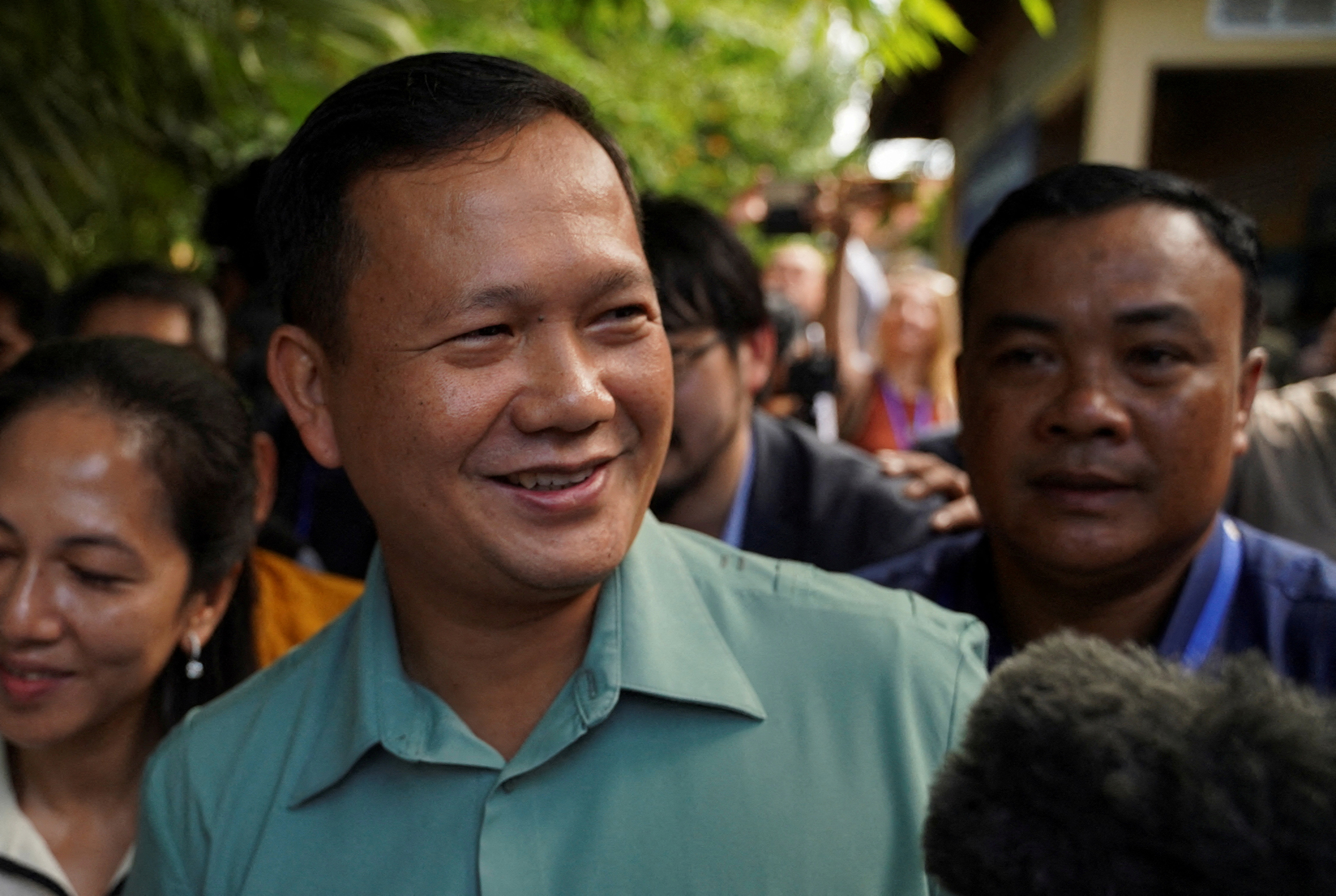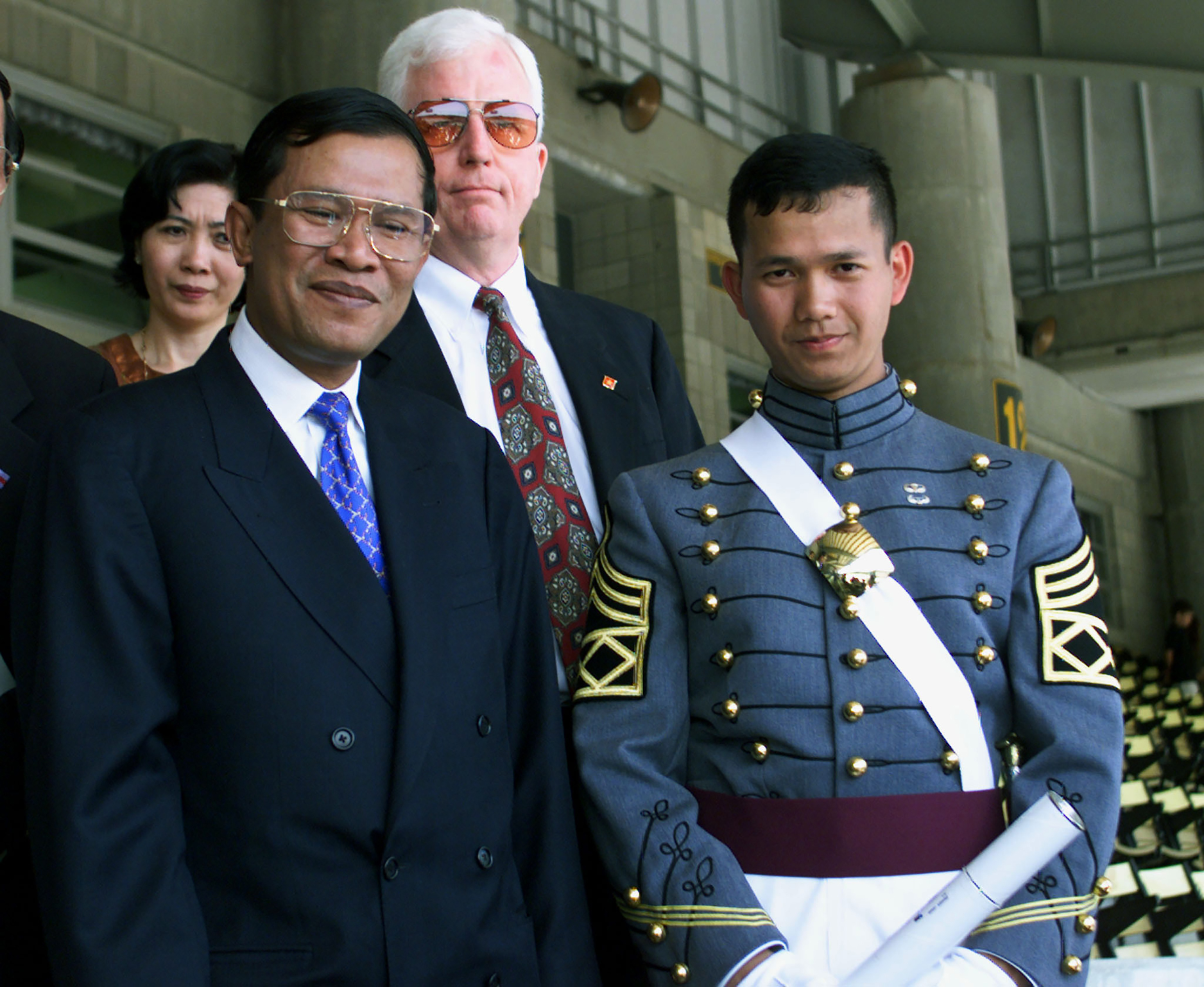
After nearly four decades as Cambodia's strongman leader, Prime Minister Hun Sen announced on Wednesday that he will step down in a matter of weeks to make way for his successor and son, Hun Manet, the country’s army chief.
Hun Sen, 70, announced his departure during a news conference in Phnom Penh, marking the start of a close to a 38-year premiership that made him Asia’s longest ruling leader. Hun Sen, who said he will remain head of the ruling Cambodian People’s Party, was once a mid-ranking commander in the totalitarian Khmer Rouge, but defected to Vietnam midway through its four-year reign. He was installed as foreign minister following the Vietnamese army's invasion of Cambodia in December 1978, becoming Prime Minister in 1985.
In December 2021, Hun Sen made it known that Hun Manet was to succeed him and the CPP backed his endorsement. The official news of this step-back comes days after the CPP reported a landslide victory in sham elections that have been criticized by the U.S. as “neither free nor fair” after the main opposition party was prevented from participating.
Read More: After Suppressing Opposition, Hun Sen Declares Landslide Election Win to Extend Rule
Some observers have suggested that the Western-educated Hun Manet’s leadership could usher in a gradual shift toward liberalization and democratization in Cambodia. But experts tell TIME they remain skeptical that any major reform will follow as the result of political patronage.
“The fact Hun Sen groomed [his son] over the course of a few decades to take the reins suggests a strong degree of trust and confidence,” Lee Morgenbesser, a Southeast Asia politics expert at Australia’s Griffith University, tells TIME. “This can be seen in not only the positions of power he gave him, but the speed within which he gave him more responsibility.”
Here’s what to know about Hun Manet, Cambodia's prime minister-in-waiting.
Who is Hun Manet?
Hun Manet is the eldest of Hun Sen’s five children. He grew up in Phnom Penh and joined the Cambodian military in 1995. Hun Manet graduated from the U.S. Military Academy West Point in 1999, and earned a master's degree in economics from New York University in 2002 and a PhD in economics from the U.K.'s Bristol University in 2008.

Hun Manet is married to Pich Chanmony, the daughter of Pich Sophoan—former secretary of state at the Ministry of Labour—and the couple have three children, one of which is a U.S. citizen born while Hun Manet was a student in the country.
“Hun Manet's ascension within Cambodia's ruling elite was rapid to say the least. Obviously Hun Sen played a large role in that, but his military training at West Point and doctoral degree from Bristol further solidified his credentials,” says Morgenbesser.
The military leader is also Head of the National Counter-Terrorism Special Forces and Commander of the Prime Minister's Bodyguard Unit, which Morgenbesser says makes him complicit in “severe repression” observed in Cambodia’s recent history.
The country has seen increasing internet surveillance and censorship as well as a growing crackdown on human rights activists, the political opposition, and free media, according to Human Rights Watch. Freedom House’s annual Freedom in the World report classifies Cambodia as “Not Free,” with a score of 24 out of 100 in the most recent edition.
Will Hun Manet’s leadership differ from Hun Sen?
It remains to be seen but experts are not optimistic. “Whenever hereditary succession occurs in a dictatorship, there is a tendency to give the new leader the benefit of the doubt. The misguided assumption is that he won't be as awful as his father; instead he will be more favourable, moderate, progressive, tolerant,” says Morgenbesser.
He adds that Western diplomats may be tempted to place significance on the newness of Hun Manet’s appointment, but “there is no historical evidence to suggest the sons of dictators are better news.”
What’s next for Hun Sen?
In June, Hun Sen spoke about stepping down as Prime Minister but said he would not withdraw from politics. “Even if I am no longer a prime minister,” Hun Sen said on Wednesday, “I will still control politics as the head of the ruling party.”
Morgenbesser says that Hun Sen’s decision to stay on as CPP head will allow his son to strengthen his power base while maintaining his own influence. “Until Hun Manet consolidates his power in such a way that he cannot be credibly threatened with removal from office, Hun Sen will have a significant say in major policy decisions, the distribution of rewards, and the selection of personnel,” he adds.
More Must-Reads From TIME
- The 100 Most Influential People of 2024
- Coco Gauff Is Playing for Herself Now
- Scenes From Pro-Palestinian Encampments Across U.S. Universities
- 6 Compliments That Land Every Time
- If You're Dating Right Now , You're Brave: Column
- The AI That Could Heal a Divided Internet
- Fallout Is a Brilliant Model for the Future of Video Game Adaptations
- Want Weekly Recs on What to Watch, Read, and More? Sign Up for Worth Your Time
Write to Armani Syed at armani.syed@time.com